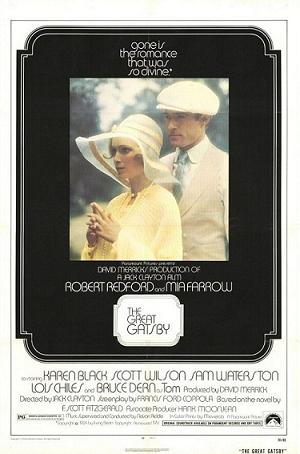 Before the Baz Lurhman/Leonardo DiCaprio version in 2013, M. Scott Fitzgerald’s The Great Gatsby already received the film treatment in 1974 via Francis Ford Coppola’s adaptation of the novel starring no less than Academy Award winner Robert Redford and fashion model Mia Farrow. I chanced upon this last night while channel surfing and decided to stick with it.
Before the Baz Lurhman/Leonardo DiCaprio version in 2013, M. Scott Fitzgerald’s The Great Gatsby already received the film treatment in 1974 via Francis Ford Coppola’s adaptation of the novel starring no less than Academy Award winner Robert Redford and fashion model Mia Farrow. I chanced upon this last night while channel surfing and decided to stick with it.
The Great Gatsby is the story of a wealthy but mysterious businessman named Jay Gatsby (Robert Redford) who lives in a lavish mansion in West Egg, Long Island. He unfailingly throws soirees every fortnight but surprisingly stays in the shadows to observe his upper class guests instead of mingling with them. He lives next door to the story’s narrator Nick Carraway (Sam Waterston), a war veteran and bond salesman who is cousins with socialite Daisy Buchanan (Mia Farrow) with whom Gatsby shares a romantic past with. Unfortunately, Daisy is unhappily married to the rich and arrogant Tom Buchanan (Bruce Dern), who is both inattentive and unfaithful to his wife. As Gatsby locates Daisy and rekindles his affair with her, he develops a friendship with Nick. But Tom, who is not a man used to losing, exhibits a mean streak and jealous frenzy upon learning of the affair, vowing to destroy Gatsby by whichever means necessary.
I did not read the book, so I had no basis to compare this classic. But what struck me about this film was how tragic the story was. Gatsby is the type of character that audiences are drawn to because of his resolve and and strength of character. Despite his humble beginnings and experiences, he was able to make something of himself to be worthy of the love of a woman he believed was waiting for him after eight years, only to find her wed and basically at the same maturity level as she was when he met her at 18 years old. It was really sad that Gatsby, blinded by love, was not able to see through Daisy’s weaknesses because he deserved so much better. Gatsby’s tenacity and resolve was the exact opposite of Daisy’s shallowness, immaturity and indecisiveness, and Mia Farrow’s portrayal was very disappointing, not giving her character the dimensions needed to explain to the audiences why Gatsby fell for her in the first place. In all of her scenes. she appeared cloying and blank — a flat character compared to the presence of Redford’s Gatsby. While Daisy’s character was annoying at best, Farrow compounded this fault by her monotonous delivery of her lines. She did a great job in getting the audience to hate her but in terms of connecting with Gatsby and the audience, I am completely at a loss. It seemed like she was on drugs and floating on air the whole time.
On the other hand, supporting characters that deserve much praise is Nick Buchanan and Jordan Baker (Lois Chiles) because of their commanding presence in the scenes they are in. Chiles’s Jordan was supposed to be a careless socialite like Daisy but her character seemed stronger because she used her brains and not simply let herself be swept away. I think if she played Daisy, it would have been better for the movie. Nick, on the other hand, by the way he stood by Gatsby until the very end, advising him with sincerity and giving him the biggest compliment by saying that Gatsby was worth a thousand of the rotten bunch (rich people) he was running around with, and the way he said he was Gatsby’s friend was the perfect person to narrate the tale. He was actually the smartest character in the bunch providing an everyman’s perspective of the story.
The film focused on Gatsby’s love story but it would have been interesting to learn more about how he got his money to emphasize the extent he had to go through to earn Daisy’s love. There were a lot of mention about his illegal activities and shady deals but it never quite got the traction it deserved.
All in all, The Great Gatsby is a great social commentary on the difference between rich and poor people at the time. The callousness in which the poor were treated and the overblown concern for status, the lack of remorse for wrongdoings and the general air of entitlement that the Buchanans, as well as the partygoers’ lack of respect for propriety in order to have a good time — and the fact that in the end, they still got away with what they have done unscathed was the biggest injustice that would linger in the minds of the audience and in a sense, its a good thing. Its just very very sad.